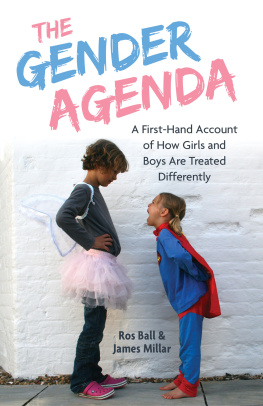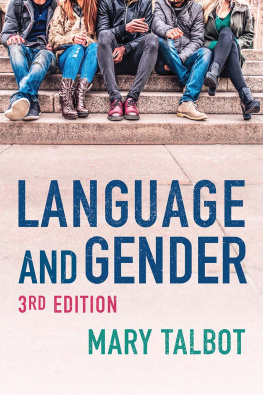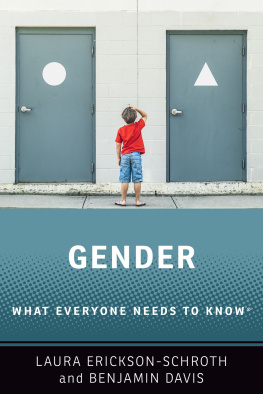DOI https://doi.org/10.21832/jule9603
Library of Congress Cataloging in Publication Data
A catalog record for this book is available from the Library of Congress.
Names: Jule, Allyson author.
Title: Speaking Up: Understanding Language and Gender/Allyson Jule.
Description: Bristol; Blue Ridge Summit, PA: Multilingual Matters, 2018. | Includes bibliographical references and index.
Identifiers: LCCN 2017059873| ISBN 9781783099597 (pbk: alk. paper) | ISBN 9781783099603 (hbk: alk. paper) | ISBN 9781783099634 (kindle)
Subjects: LCSH: CommunicationSex differences. | Sexism in language.
Classification: LCC P96.S48 J685 2018 | DDC 408.1dc23 LC record available at https://lccn.loc.gov/2017059873
British Library Cataloguing in Publication Data
A catalogue entry for this book is available from the British Library.
ISBN-13: 978-1-78309-960-3 (hbk)
ISBN-13: 978-1-78309-959-7 (pbk)
Multilingual Matters
UK: St Nicholas House, 31-34 High Street, Bristol BS1 2AW, UK.
USA: NBN, Blue Ridge Summit, PA, USA.
Website: www.multilingual-matters.com
Twitter: Multi_Ling_Mat
Facebook: https://www.facebook.com/multilingualmatters
Blog: www.channelviewpublications.wordpress.com
Copyright 2018 Allyson Jule.
All rights reserved. No part of this work may be reproduced in any form or by any means without permission in writing from the publisher.
The policy of Multilingual Matters/Channel View Publications is to use papers that are natural, renewable and recyclable products, made from wood grown in sustainable forests. In the manufacturing process of our books, and to further support our policy, preference is given to printers that have FSC and PEFC Chain of Custody certification. The FSC and/or PEFC logos will appear on those books where full certification has been granted to the printer concerned.
Typeset by Nova Techset Private Limited, Bengaluru and Chennai, India.
Printed and bound in the UK by the CPI Books Group Ltd.
The world has changed a great deal over the past few years on a wide range of geopolitical realities as well as on gender issues. For example, less than a decade ago, little attention was paid to transgenderism, but there is now significant discussion on the issue. There have also been an increasing number of conversations in the West concerning diversity, including gender related ones, such as the use of the veil among Muslim communities. How gender is a part of religious communities, including Islamic communities, was not on the radar twenty-years ago. Much more attention is being given to the notion of the continuum of gender identity in various settings, including in schools and as revealed and lived out on social media relations with the steady changes in technology opening up new contexts for gender. There have been various public awareness campaigns like Ban Bossy, I am a Girl and Emma Watsons HeforShe reveal how public discourse has shifted more towards the connecting of language and gender than ever before. And 2018s #Metoo and #TimesUp movements have altered the way Hollywood recognizes sexual harassment. It seems the world has caught on to the power of language in meaning-making and in framing gender/sexual identities and relationships.
We are so much more aware of gender as a key variable in who and what we are and, specifically the concern here, in how we use language to inhabit our spaces and places. It is now well understood that everyone needs to work together to make the kind of world that is just and sustainable for all of us. Catherine Redfern and Kristin Aune (2013) discuss the developing new feminism that is attracting fresh and vibrant young people to the field. British actor Emma Watson is an example of a vibrant and engaged new feminist, and the #Metoo generation has moved feminism along to a new accountability regarding sexism in the workplace. More and more young people are engaging with the field after what has seemed to be a period of apathy that expressed a kind of battle fatigue concerning feminism throughout the 1990s and early 2000s. The stakes seem higher than ever as we face yet more complexity related to how gender issues fit into some of the worlds most pressing problems: a major shift in American politics to the right; increase awareness of sexual harassment by (often) men in positions of power; Islamic terrorism and violence; the refugee crisis; gender-based violence on university campuses and in conflict zones; increasing poverty in developing countries; shifts in geopolitical alliances; climate change; assaults on Western democracies; and the continued and even greater risk for girls and young women seeking an education in many areas of the world where their participation is limited. It is because of these concerns and the rise of new and compelling feminist concerns that many writers such as Redfern and Aune see a new excitement in the feminist movement which seems to be growing exponentially (2013: x).
This book is designed to be an accessible introduction to academic research in this dynamic field. So much of what we hear from others or read about in magazines or hear about on talk shows is other peoples opinions, and other peoples opinions do not really reflect current research on a whole assortment of gender and language contexts. Spoken language use and gender as a social variable intersect in the key contexts in which we live our lives, such as in the media, in schools, in the workplace, in religious communities and within family life.
Speaking Up: Understanding Language and Gender is an exploration of the ever-widening research area of gender and language use and the changes in many communities regarding gender equity issues. It is my hope to encourage those with interest in these issues to understand some of the past and current complexities surrounding gender and language and to consider some new directions that are already becoming increasingly clear. In many parts of the world, language remains a key tool of oppression used to ensure that (often powerless) women and sexual minorities do not share power equally with white heterosexual men. I believe that if we can make hidden assumptions about gender and language more explicit, then we can play a part in making this world a better place to live as human beings. Also, such is the pace of change in these areas that this book is a snapshot of current thought. Who would have imagined the reality of a Trump presidency a few years ago? One cannot miss the connection of gender and language watching America under Trump: for example, the way he dismissed his opponent, Hillary Clinton, and other women, mocking a womans appearance and discarding womens voices entirely. As his presidency goes on, I suspect there will be more examples of how language is used to limit the involvement and contributions of others in positions of power and how gender identity shapes beliefs and attitudes and, language use. In such ways, I see gender, sexuality and language continuing to shift alongside the study of gender, sexuality and language. In my opinion, this study will continue to be one of the most compelling areas of study around the world. I hope you will agree.







